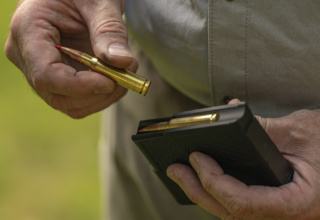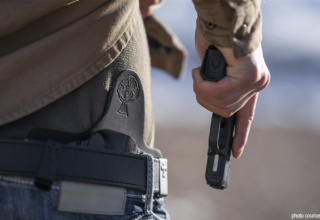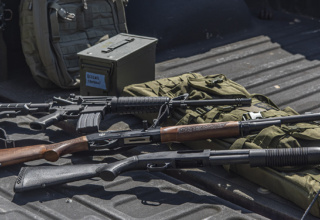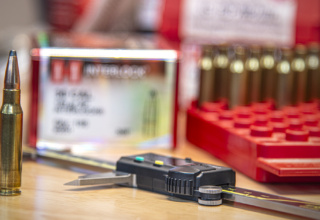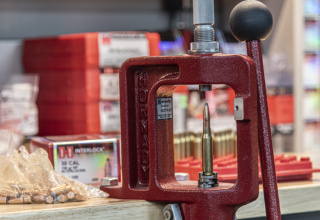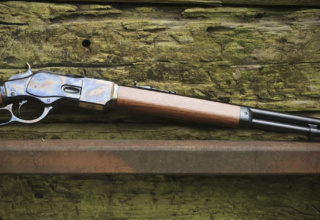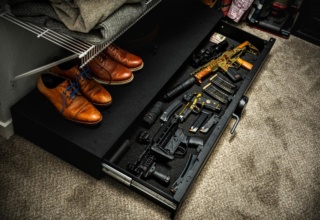A practicing off-grid/self-sustainment expert explains the steps you need to take immediately to prepare for the worst while hoping for the best.
by Michael Bunker
[Editor’s Note: While Shoot-On is dedicated to providing the latest in shooting and hunting topics, how-to information, and reviews of the newest gear for hunters, shooters, and self-defense practitioners, our Prepare • Sustain • Defend TM series is intended to present ALL Americans with information they need during these unprecedented and uncertain times.
In this, our second installment in the series, we reached out to noted off-grid expert and self-sustainment authority Michael Bunker for insight into what we all should be doing and thinking about to get through the near-term crisis and to prepare for the unknowns which may be before us in the long-term. We tapped Michael for this piece because he is not a “theoretical” writer on these topics — he actually lives the lifestyle and has developed practical insights and practices based on doing and learning what works and what doesn’t.
Because this and all articles in our Prepare • Sustain • Defend TM series are, or should be, of interest and value to everyone, particularly those outside of the traditional rural/hunting lifestyle communities, we are asking our readers to share these articles across their personal social platforms to help those who need them most. Go here to see the first article in this series, which answers questions non- and first-time firearm owners have about taking the first step to personal and family defense.]
Taking responsibility for stabilizing yourself, family, neighborhood, and society is more than just having the right and obligation to defend yourself. Take it from me. I’ve been living off the grid for 15 years, and in those many years, my life and weird minimalist/off-grid lifestyle choices and survival philosophies have been featured in national magazines and in hundreds of podcasts, trade magazines, documentary films, news programs, TV serial pilots, and even on NPR. This isn’t a job application. It’s just my way of telling you that I know a little about living without all the benefits of a highly technical and efficiency-based modern society, and what I’ve learned may be of some help to others at a time like this.
So, what does “off the grid” really mean?
It can mean a lot of different things to a lot of people. The simplest definition is that being “off-grid” simply means a way of living that is independent of, or not reliant on, public utilities. Again, that is a pretty broad definition. It can include everything from millionaires in their solar-powered mansions to mountain people living in caves, or bushcrafters and homesteaders who prefer to live closer to the land. In the past 15 years, the question I’ve heard the most is, “How can you be a USA Today Bestselling Author, be on Facebook and social media, have a YouTube channel, et cetera, and live off-grid?”
Easy. Let me explain.
In our life — at our cottage and on our farm — we are not connected to any public utilities. Not even the Internet. You can think of this as an Amish-like farm and homestead. We use some electric devices, like our nighttime headlights, an emergency radio, or a small fan for when it is hot, but we have no outlets and no electrical service at all. I’ll explain how I charge the batteries in a moment. At the cottage, we also do not have any alternative source of power…no solar, wind, or other generation capability.
How am I typing this article into a laptop, and how do I send the completed article through the Internet?
On my property, about 700 feet from my cottage, I have a small office. My office is powered by a very small solar power array. I produce just enough electricity (and sometimes not enough) to charge my laptop, power the wireless Internet, and to charge other batteries and my smart phone. None of this is necessary for my or my family’s survival. It is only necessary for our outreach. It’s how I talk to you. I can and have lived just fine without it.
When it comes to knowing how to live without the services of our modern utilities and the “Just-in-Time” delivery of goods and services, we’ve been there, done that, and continue to do it.
For many years, when my children were smaller and at home, we would even further disconnect, and we did it every single year. We called it “The December Project.” We would stay home, not go to town, and not get online or participate in any Internet or social media for one or two full months. No stores, no movies, no chats, no phone calls. We received snail mail and that was it. This was our way of training ourselves for what is now called “social distancing” and “home quarantine.” We were doing Stay-At-Home orders before it was cool. We learned how to live minimally and how to survive by what we could produce. We learned how dependent we’d grown on the “store” — shopping for our necessary supplies. We learned how to make do or do without. We learned what happens when you run out of stuff and what stuff you don’t want to run out of. We learned how to live through something like Covid-19, no matter how long it lasts.
I would add that I’ve also been teaching survival, preparedness, and independent living for almost 20 years.
So, here we are…
Based on all that experience, I want to offer you some free advice. Here are seven things you should be doing RIGHT NOW!
#1 BUILD YOUR IMMUNE SYSTEM
That would take forever, right? Years and years? Nope. You can start to rebuild your immune system in as few as 24 hours.
I know that fasting, intermittent fasting, and a dozen other fasting iterations have kind of become the newest fad. But fasting is no fad. It’s one of the oldest survival techniques in existence. If you read the Bible, fasting is in there from cover to cover. Regular fasting was the way that most humans lived for millennia and there were notable and provable benefits to the practice.
One of benefits that has the most science behind it is called autophagy. Without getting too sciency and making it too complicated, let’s look at it this way. Due to the Hormetic Effect and bunch of other magical reasons, when the human body goes through certain stresses (like fasting,) old, damaged, sickly, and broken cells are discarded or consumed by the body and are eventually replaced with healthy cells. What this means is that you can (in simple terms) get rid of bad cells and re-grow new cells that are healthy. You can reset your immune system, and this process begins after just 12-16 hours of fasting. It begins to really get going when you can fast for over 24 hours. At 72 hours of water fasting (water only,) your organs will have shrunk by as much as 30 percent! And they will regrow with healthy cells as soon as you begin to “re-feed.”
Listen, this isn’t an article just on fasting.
It’s not surprising that many doctors and scientists are now connecting obesity as a major compromising element in the cases of Covid-19 that go poorly. But here’s the deal: you can begin to lose weight, feel better, and restart your immune system in just a few days. Regular exercise, regular fasting, and smart food choices right now could increase your survivability more than just about any other thing you can do.
#2 PLANT SOMETHING
Now is the time to be putting in a garden. Not just because it is spring, but because we don’t know how long the Coronavirus (and the unintended consequences caused by it) will last. There is so much that we don’t know. We don’t know if there will be cascading failures as the number of sick and dying increase. When the cops go home sick, and the military is hit hard, and the first responders and doctors and the people who keep your Internet going all are affected, will we lose major grid services? It’s very likely. There are already anecdotal stories of these kind of interruptions. Things could go very bad, and if they do, the people who are able to produce something will be exponentially better off.
And don’t you fall for the defeatist idea that growing food during a major systemic crisis is just “growing it for the biggest bully on the block.” That’s ridiculous and it isn’t supported by history or reality. Take this little tidbit in and mull it around in your mind — the Amish are still here and still producing food. They have seen the Russian Empire disappear and the Japanese Empire go the way of the Dodo Bird. The Ottoman Empire is gone, the British Empire has faded into history, and the French Empire is a faint memory. The armies and marauders that crisscrossed Europe for hundreds of years (like Napoleon) are gone into the dustbin of history, and the Amish are still here. Growing crops. Growing food makes you valuable. Think about it. It also means you get to keep eating.
#3 THINGS YOU SHOULD BUY
Everyone who knows me knows I’m not a “buy stuff” gear and gadgets kind of guy. I’m a guy who preaches that you need to PRODUCE. Storing stuff is great, but I went past being a prepper a long time ago. I’d rather store up what I can produce, but here’s the deal: maybe you can’t, or didn’t, or maybe we’re way past that.
Because of normalcy bias (see my video on Normalcy Bias), people didn’t think about things. Or, they thought about them and dismissed the threat. Or, maybe they convinced themselves they still had time. So, as this crisis deepened, everyone ran out and bought toilet paper.
Interesting. I don’t judge them. I understand.
Toilet paper has become a ubiquitous, modern “need” in the western world. Kind of nice to have, even though it is a rather new arrival on the personal hygiene scene, if considered as a mass-produced consumer item (appeared in the 1850s.) Although I can’t say that no one ever died for lack of toilet paper (there is no way for me to know that), let’s just say that in no way is toilet paper a mandatory, must-have survival item.
Let’s get this straight. NOTHING that has only been available as a mass commercial item for 150 years is an absolute survival necessity. And, while the masses ran to the stores to binge-buy the toilet paper and the hand sanitizer and the empty calories, the things that could keep you and your family alive sat on the shelves unmolested. The three things I grab if I make an emergency run to the store? Here they are…
- Salt
- Fat (Lard)
- Dried, cured, or canned meat
Those things are in first place. Everything else is in second.
SALT is a preservative. You need it to live. It is a barter item. It has inherent value. If you end up killing a moose, you can preserve the meat (unlike that guy who starved himself to death up in Alaska even though he killed a moose).
Once upon a time, salt was money. That’s where we get the term SALary. Caesar’s troops were paid partially in salt. If you aren’t any good, you aren’t worth your salt. Get it? You need salt. A lot of it. Its stores forever, is cheap, and it doesn’t take up much space. In a crisis, you’re rich.
FAT. Our society has demonized it, shamed it, and banned it from their diets and vocabulary. But fat is what keeps the species going. It makes the brain work properly, and without it you will die.
Listen, you ain’t takin’ your backpack and your pocketknife and going out into the wilderness to survive. Sorry, but you aren’t going to make it very long out there, if you try that. And if you do get a bunch of rabbits? Rabbit starvation. Look it up. Even at home, most people have pantries devoid of essential fats. So, get this…fat is essential for life. It will keep you going. Lard is also shelf-stable at moderate temperatures and doesn’t require refrigeration. Get some. Get a lot.
MEAT. Yeah, yeah, yeah. Maybe you’re not a meat eater. So, skip this at your own peril. But while some people are trying to survive on the veggies from the garden and the store is either closed or is stripped of essentials, the people with an ample supply of meat will be doing alright.
A few days after the masses stripped the stores of TP, white bread, and milk, I went to the local store and bought pounds of dried/cured sausages. Shelf stable, full of protein, and lots of great calories. Now, if I get to town, I buy a bunch. EVERY. SINGLE. TIME. Jerky is ok but is expensive. Tuna, sardines, and other canned meats are cheap and plentiful. The store has never yet sold out.
I’m not saying you are going to hole up in your house and survive on lard, salt, and meat (though you could do worse,) but these things will keep everyone working and thriving while your garden comes in or while you fill in your other needs in other ways.
#4 MEET A FARMER
Number Four was going to be chickens and eggs, but I can hear the cacophony of suburbots yelling, “But my HOA won’t allow chickens!”
If things go bad, that will pass, but for now, take some time and do some research. Somewhere near you there is a guy like me. Not a farmer on a huge, industrial scale, but a small-scale homesteader who probably has chickens, eggs, pigs, et cetera. If this thing goes long-term, you will thank me every day of your life for this advice.
The time to meet your local farmer and help him/her and make friends is LONG before things get really, really rough. You want their help in the fall if this Covid-19 comes back worse, or if we are stuck in this mandated quarantine zone for 12-18 months. Make it a mission to meet and help a small-scale farmer. If you have ever been to a farmer’s market, there was a small-scale farmer there. Ask around. Use Facebook groups and searches to find someone. At our local grocery store, there is a bulletin board. People put up posts about selling chickens and pigs. Start there. And when you find them, introduce yourself. Ask how you can help them RIGHT NOW without expected return. They won’t think you’re weird.
You don’t think I could use help right now? But no one cares until it’s too late and that farmer must do triage to decide who to help. You’re about to get a stimulus check. Well, maybe that farmer can use some dough to increase production. So, make an investment. Ask if there is some other way to help. You city folk call this “networking,” but if you do it now, you could be saving your own life. Also, get chickens and eggs.
#5 MAKE USE OF YOUTUBE
Turn off Netflix. I know you’re bored, bouncing off the walls, dying to get back to your life. But you may also be ignorant, untrained, and unskilled in the ways of survival life. You have almost certainly deceived yourself if you think you are some kind of Survivorman, even if you are ex-military. Highly trained survivalists rarely last longer than 90 days in the bush, trying to survive off the land. Even at home, most people are so colonized and conditioned to the Just-in-Time delivery of goods and services that they have zero practical survival skills.
Well, guess what? Everything is on YouTube. Everything. Want to know how to butcher a squirrel? Make cordage? Start a fire without a lighter? It’s on YouTube and, as of this writing, YouTube is still up and running. Learn something new EVERY DAY, and then go out in your backyard and practice. If you don’t have the requisite tools, get on Amazon and order them or find a YouTube video that teaches you how to make the tools.
#6 THE BUNKER PRINCIPLE
There is a video on my YouTube channel that teaches the Bunker Principle. The Bunker Principle is this: have three categories of ways to do things. EVERYTHING.
Ask yourself, how would I do [fill in the blank] if my on-grid utilities are not available? Start simply. “How would I make coffee?” Then you figure out three categories of ways to do it.
- Category 1: The on-grid way. Easy. Use your electric range or natural gas stovetop.
- Category 2: The off-grid way. Use your propane grill or a camp stove. It’s not sustainable forever, but it’ll get you through for a while.
- Category 3: All those ways are not available? Learn to build a safe fire pit, start a fire in any condition, and how to cook on that fire.
Any task, any luxury, any necessary or essential duty, you have three categories of ways to do that thing. You can have more than three ways but have the three categories covered.
#7 COVER YOUR BASES
Look at this list: water, food, shelter, heat, light. Now, go through the list with the Bunker Principle in mind. Don’t trust that the water from your tap is going to keep flowing. You may need to catch water off your roof or in some other manner. Make sure you can purify that water (think PUR water pitcher filters or Berkey Filters.) Think about your food supply. Don’t fill up on empty calories. Get shelf-stable products that are high in calories and nutrient-dense. Shelter. What if you must move? What if you get Covid-19 and you don’t want to infect your family? Can you live in a tent in the backyard for two weeks? Have a way to make heat so you can cook and purify water and just stay alive if necessary. Light. Not an absolute necessity, but sure nice to have. Headlights, flashlights, lanterns. And think of ways to power those things without a cord. Rechargeable batteries? Solar power?
Ok, so I could go on and on. I have produced dozens of videos covering a lot of these things in detail. Some of them sound simple, but if most people were doing these things, we wouldn’t have the stores stripped of toilet paper when other things are more important.
The most important thing is to not succumb to a defeatist attitude. Don’t rely on someone or something else to do YOUR JOB of providing for yourself and your family. Don’t say, “Well, that’s the government’s job.” It is definitely your job. Don’t say, “This thing will be over in 12 weeks, so I’m just going to gut it out.” Maybe it will be over in 12 weeks, but I doubt it. And, maybe it comes back. Maybe it comes back worse. Maybe the Coronavirus was never “the thing” (see my video The Thing is Never the Thing) but maybe the human mass reaction to the thing is the real thing. Stop looking at the virus and start studying how people act and react when under stress.
Your life, your family, your security is your job. Time to get to work.
About the Author: Michael Bunker is a non-fiction and fiction author, historian, and one of the country’s foremost experts on off-grid and self-sustainment lifestyles. Michael maintains several social media channels offering advice and how-to information for those interested in learning about reducing reliance on public utilities and the “Just in Time” supply system. He is also author of Surviving Off Off-Grid: Decolonizing the Industrial Mind.
- Blog: http://michaelbunker.com
- YouTube: http://youtube.com/bunkdad
- Facebook: http://facebook.com/offgrid
- Instagram: https://www.instagram.com/michaelbunker/
- Covid-19: Seven Things You Should Be Doing RIGHT NOW! - April 3, 2020



